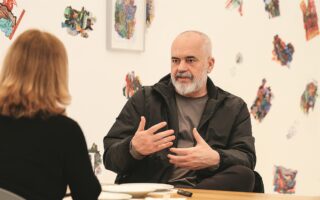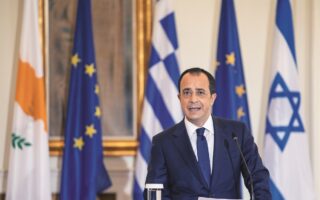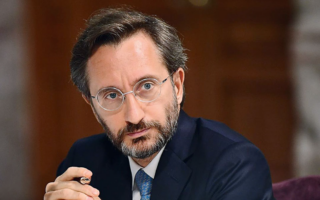Berlin ‘ready to contribute’ to Athens-Ankara thaw
Speaking to Kathimerini, chancellery’s foreign policy adviser stresses importance of communication between Greece and Turkey

There are encouraging signs of progress in Greek-Turkish relations, according to the German Chancellery’s Foreign and Security Policy Adviser Jens Ploetner. Speaking to Kathimerini as he attended the eighth edition of the Delphi Economic Forum, the former German ambassador to Athens stresses that Berlin is ready to facilitate bilateral contacts “if so wished by the parties.”
A close associate of Chancellor Olaf Scholz, Ploetner refutes challenges to the sovereignty of one NATO ally from another, but makes it clear that as far as German diplomacy is concerned, “having open and solid lines of communication with Ankara is not only useful but necessary.”
Referring to the ongoing Russian invasion of Ukraine, Ploetner believes that peace “lies in a change of mind in Moscow,” while on the matter of the European Union’s stance towards Beijing, he says China is “a partner, an economic competitor and a systemic rival.”
An effort is under way to improve the climate between Greece and Turkey, and you have attended diplomatic meetings between Athens and Ankara. How does Berlin follow these developments and what role can Germany play in Greek-Turkish relations?
Good-neighborly relations between Greece and Turkey are important not only for both countries, but for the Euro-Atlantic community as a whole. After all, our common goal should be to exploit the full potential of cooperation in the Eastern Mediterranean region. For the benefit of all countries. The enormous solidarity Greece has shown toward Turkey in the aftermath of the horrific earthquake has been remarkable and – I believe – well-received in Turkey. And President Erdogan was one of the first foreign leaders to express his condolences after the terrible train accident in Greece. It is also very encouraging that the two governments have met on several occasions in the past weeks. Obviously, I understand that complicated issues remain, but this spirit of dialogue and cooperation certainly forms a good basis for future progress on substance. If so wished by the parties, the German government stands ready to contribute to this process.
The impression has occasionally prevailed in Greece that Germany generally keeps an equal distance from Greece and Turkey in the bilateral conflict, despite Ankara’s aggression in the Aegean. Are these complaints justified in your eyes?
My experience is that beyond rumors and fabrications, those responsible understand that having open and solid lines of communication with Ankara is not only useful but necessary. This does not prejudge our position in substance – such as clearly refuting when one NATO ally questions the sovereignty of another.
‘I understand that complicated issues remain, but this spirit of dialogue and cooperation certainly forms a good basis for future progress on substance’
What is your expectation for the upcoming elections in Turkey?
It is up to the Turkish people to cast their vote.
In the meantime, the war in Ukraine continues and we appear to be at a stalemate. When do you think the time will come for meaningful negotiations between the two sides, if that is the goal?
For us, it is clear that nobody wants peace more than the people of Ukraine. President [Volodymyr] Zelenskyy’s peace plan is a clear reminder of this. But unfortunately, up to now, we have not seen any Russian willingness to engage in serious negotiations – in negotiations that do more than simply confirm Russia’s land grab.
The key to peace, therefore, lies in a change of mind in Moscow. By withdrawing its troops from Ukraine, Putin could end this war immediately. In the meantime, we will continue to support Ukraine together with our partners for as long as it takes in exercising its right of self-defense.
French President Emmanuel Macron’s recent trip to China and the emphasis he placed on the need for Europe’s strategic autonomy have opened a debate about the stance Europe should have toward the two superpowers, the US and China. What is the view of German diplomacy on this matter and where do you see any deviations from the French approach?
We share with the French government the strategic goal to create a strong, sovereign European Union in all the dimensions that go along with it in terms of economic power and foreign and security policy. To this end and as a joint priority, we will continue to invest in the cohesion of the European Union and into NATO, together with our partners and allies – first and foremost the United States.
On China, EU member-states share the strategic view that China is at the same time a partner, an economic competitor and a systemic rival. Germany’s relations with China are based on this approach: China is a crucial partner to tackle global challenges such as climate change, shrinking biodiversity and excessive debt. When Chancellor Scholz traveled to China in 2022 and addressed the Russian aggression against Ukraine, President Xi and the chancellor agreed publicly that the threat with or the use of nuclear weapons is unacceptable. That was an important signal. China also remains a central business and trading partner. However, there is little doubt that the China of today is different from the China of the past. Our political and economic posture must therefore also reflect this more competitive and rivalrous stance. It is, therefore, in our own best interest to diversify trade relations, to reduce critical dependencies. De-risking, not de-coupling is of the essence – an approach shared by the president of the European Commission in her recent speech on China.
The American Inflation Reduction Act program seems to deprive Europe of investment and indirectly highlights any competitiveness deficits in the European economy. Some are in favor of a bolder European response to the Biden administration’s investment policy, aimed at keeping European businesses operating on European soil unhindered. What is your opinion?
The climate policy goal of IRA is a welcome policy change of the US, especially in view of its large economy. At the same time, we are concerned about some of its elements which discriminate against European businesses and can reroute investments away from the EU to North America. That is why the talks between the European Commission and the US administration regarding the implementation of IRA are so important. At the same time, it is clear that Europe has to work on further strengthening its own competitiveness. This has also just been underlined by the European Councils in February and March which have initiated a competitiveness agenda, including for a growth-enhancing regulatory environment.
Any thoughts on Greece and the upcoming elections?
It would be unwise to comment on upcoming elections, all the more in the case of close partner countries. But I can assure you: The German government is working very well with the government of Prime Minister [Kyriakos] Mitsotakis and it will continue to work closely with a future Greek government, bilaterally and in the frameworks of the EU and NATO.





